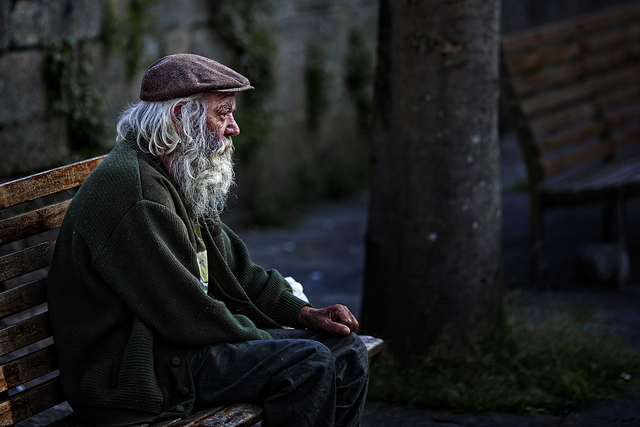There’s a man sitting on the street wearing an old coat cracked from the cold. His nose is running and his eyes are almost dead with sorrow.
He looks up at you and speaks in a tone that assumes the answer before he even asks the question:
Please. Can you help me.
What does it take for you to walk past him?
For me, it takes a lot. A deep breath, a stiffening of my spine. It takes me swallowing the bile that builds up in the sides of my cheeks. For me to walk past someone homeless, it takes every single piece of my heart to momentarily suspend movement.
I don’t have any change.
Once I am safely past him, I can exhale. I can take a sip of the warm coffee in my hand or a bite of the giant cookie I have bought and was too ashamed to flaunt in the face of this person who has nothing. I can go on acting as if they never existed.
At least I could. But that was before.
Before I got the text that my homeless uncle had died last spring.
I was sitting in a steamy local coffee shop on the North Side of Chicago. I stepped outside, blasted by the city soundscape and the caffeine in my system which was coöpting the feeling in my bones.
I read the text again.
They found Uncle Mike. He’s dead.
I started hearing details on my walk to Montrose Beach. Mike had died of pneumonia; he’d been alone. He’d been kicked out of the shelter for drinking. The police had to circulate a photo of him so someone could claim his body. It was like he didn’t exist. That was the part that almost broke me.
They found Uncle Mike.
He had been reduced to a police photo, looking every bit the wild-haired, disheveled man that most people associate with homelessness. I hadn’t seen him in years, so I tried to rack my memories for a picture I could keep. I wanted to remember him as I’d known him, not as the world saw him in his last days.
They found Uncle Mike.
I tried to remember him before he was ever lost.
My earliest memory of Mike was when my grandma took me to see Dickens’ play, “A Christmas Carol,” where he’d played the Ghost of Christmas Past. I was five.
I gripped her hand tightly as we walked through the theater lobby. I had on my favorite Christmas tights and a red corduroy dress. The actors from his cast were strewn about the aisle in some costume designer’s best version of street urchin rags. They were begging for food—for help. The memory is somewhat haunting now, almost prophetic.
My grandma told me I started to cry and couldn’t understand that they were just actors, that it was all to create Dickens’ world of street life and sadness. I couldn’t understand why they didn’t have a home. I couldn’t process why everyone was walking past them and no one was helping.
As an adult, 30 years later, I am still baffled by the same thing.
Mike took the stage and I forgot all that. I forgot where I was, even who I was for the time he embodied the Ghost of Christmas Past. I don’t even think I realized I was holding my breath while I watched him act. I will always associate Mike with that holiday.
We used to spend Christmas Eve at my grandparents’ house and inevitably my grandmother would knit lumpy, ill-fitting hats for all her sons and grandkids to wear. These were the good days in my family, before alcohol took away two of my uncles.
Mike stirred the pot of mischief every time, making the night feel as if it could go off the rails at any moment. Usually it did. Wild, often violent games of spoons were played at his suggestion. Injuries were sustained. Tables and rules broken. When it got to be too rough for my grandma, carols were belted out with abandon while she played the piano in an effort to herd the cats.
Mike made 12 posterboard signs with corresponding days of Christmas and crudely drawn stick figure calling birds and geese a laying. He stapled them to paint stirrer sticks and passed them out to the entire family.
Mike always got five. Always. We grandkids got lower numbers; the more active roles. If you had the partridge in a pear tree, you better step up. Next to “five golden rings,” that was the star of the show. We’d give high numbers to Great Aunt Phyllis who was nearly deaf. You’d have to nudge her when it was her turn to hold up the sign.
If you brought a significant other, they were silently rated on their willingness to play along. They’d also get a high number, like 11. Though not a scientific process, I did notice that those who shied away or refused to play along did not return the following year.
Everyone was a ham on this occasion, especially the grandkids. We held up signs and mimed calling birds, the motions getting frenetic as the song sped up. But no one could top Mike’s antics. He would milk his five golden rings attention for minutes, holding the note until he was so red you swore he might drop dead in front of you. That’s what I think of when I remember him.
Mike was a lot of things. He bought me a dump truck when I was little so I would never be “too girly.” I slept with it for years, until I shared the fact with my Brownie troop and was immediately ridiculed. I dropped out shortly after. Mike won that round. He taught me to ride a horse. He who told me once that I was cute but not that bright and my sister was the smart one. It took a long time for me to believe otherwise.
Like I said, my Uncle Mike was a lot of things. He used to be married to my aunt Cindy. I never knew what happened to them. Just one day, she wasn’t my aunt anymore. And yet she was one of three guests at the funeral service my dad organized. Mike was my theater hero. When I started acting and landed a lead role in college, we finally had something in common. We talked like old stage veterans and I saw him as a person, deliciously flawed and likeable. Mike was a brother. My dad’s favorite brother, probably. And he was an alcoholic.
Mike was sick for a long time from a disease we never named in my family. He couldn’t live in a shelter because they wouldn’t allow alcohol. He wanted to read old novels and drink whiskey. He wanted to watch Errol Flynn movies on his fuzzy old TV set. He was a romantic; an old soul who never quite fit into the modern world. I think alcohol became Mike’s shelter.
Maybe this element of his story makes it easier to digest, to compartmentalize. If you drink and you can’t control it, you’ll wind up on the streets. So we work hard, we are responsible. That adds up to security in our minds. But we all know that isn’t true either. Security and homelessness are not mathematical.
I see a lot of fear surrounding this issue, in both our local and global neighborhoods. It seems we are afraid homelessness is communicable.
Maybe the reason we are afraid of letting the homeless and refugees affect us is because in acknowledging them, we must acknowledge our shared vulnerability. Once that is done, we can see none of us are guaranteed a good life. Things happen. Life is wildly unpredictable. After a while, I realized that how we choose to treat each other is about the only thing we can control.
I couldn’t help my Uncle Mike. I don’t know if he wanted it. But I can make sure I am kind to people who have nothing. It’s a way to both grieve and honor him.
I think about Mike from time to time, especially as Christmas approaches. It’s different now on my dad’s side of the family. Alcohol has kind of stolen the magic that used to surround Christmas Eve. Two of my uncles are dead and so is my grandpa. We still gather each year to eat lutefisk like good Swedes and sing the occasional carol. But our hearts have stepped quietly away from the celebration. The grandkids never try to sneak into the attic and get freaked out by old dollhouses anymore or hide notes for each other in the basement. The rubber band guns Mike made for us have long been gone. The ghosts of our past Christmases, I guess. I wonder what ever happened to those flimsy, hand drawn signs he made.
And I can’t help but wonder: Did people see him and cross to the other side of the street? Did he make a sign to ask for help with crudely drawn stick figures and a paint stirrer handle?
Can you help me.
More likely, it was a highbrow quote from some old classic novel he’d read and thought was amusing. Knowing him, he would have loved the weird looks people gave him who didn’t understand.
I wonder if anyone gave him change. Or leftovers. I wonder if he had homeless friends who looked out for him.
But mostly, I wonder if people knew all these things about him, would they treat him differently? If they knew he was my uncle. An actor. An ex-husband. A high school football player. Wearer of horrible knitted beanies and player of violent spoons games. Singer of carols and person with the loudest, most ridiculous laugh I have ever heard.
I wonder if we imagined everyone this way, what it would take to walk past them.
Relephant Favorite:
Nine Common Misconceptions About the Homeless.
~
Author: Erin Johnson
Editor: Travis May
Photos: Flickr/Feans











Read 9 comments and reply